Ukraine agrees to talks with Russia as Vladimir Putin puts nukes on high alert
Ukraine says it will hold talks with Russia at its border with Belarus after a call between President Volodymyr Zelensky and Belarus leader Alexander Lukashenko.
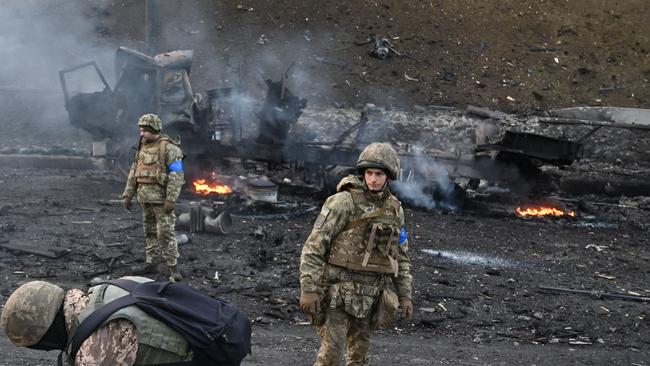
Ukraine says it will hold talks with Russia at its border with Belarus —– near the Chernobyl exclusion zone – after a call between President Volodymyr Zelensky and Belarus leader Alexander Lukashenko.
“The politicians agreed that the Ukrainian delegation would meet the Russian one without preconditions at the Ukraine-Belarus border, near the Pripyat River,” Mr Zelensky’s office said early on Monday (AEST).
As the talks were announced – and Western countries lined up to send arms into Ukraine and impose ever more stringent sanctions — Russian President Vladimir Putin ordered his defence chiefs to put the country’s nuclear “deterrence forces” on high alert.
Mr Putin accused Western countries of taking “unfriendly” steps against his country. The US said Mr Putin was “manufacturing threats” with nuclear force alert
Mr Zelensky has said he would not hold talks with Russia on the territory of Belarus, where some Russian troops were stationed before invading on Ukraine’s northern border.
But Kyiv said Mr Lukashenko assured Mr Zelensky that “all planes, helicopters and missiles stationed on Belarus territory will remain on the ground during the travel, negotiations and return of the Ukrainian delegation”.
Mr Putin has said that a Russian delegation was in the Belarusian city of Gomel.
Moscow has wanted to hold the talks in Kremlin-aligned Belarus. Mr Zelensky, refusing to travel to Minsk, said Kyiv had proposed “Warsaw, Bratislava, Budapest, Istanbul, Baku” as options to Russia.
Earlier, Ukrainian soldiers and newly armed civilians fought fierce gunbattles with Russian troops on the streets of Kyiv and the northeastern city of Kharkiv, as Mr Putin pounded the country with cruise missiles while facing unexpectedly stiff resistance from local forces.
The US said most of the 150,000 Russian troops massed against Ukraine had entered the country by the fourth day of the invasion, mounting armoured assaults, rocket strikes and airborne landings.
US President Joe Biden and his European allies – furious at the escalating conflict – responded with fresh sanctions against Russia, kicking its banks out of the SWIFT international payments system, isolating its central bank and stopping rich Russians from buying “golden passports” to evade blacklists by becoming foreign citizens.
Ukraine’s government said Russian forces were attacking the capital but had been unable to advance, while defenders were “eliminating” enemy troops in street battles in Kharkiv.
A defiant Mr Zelensky said his people had “derailed” the Kremlin’s war plan, and would not give up the fight. “We will fight until we have liberated our country,” he said in a video message.
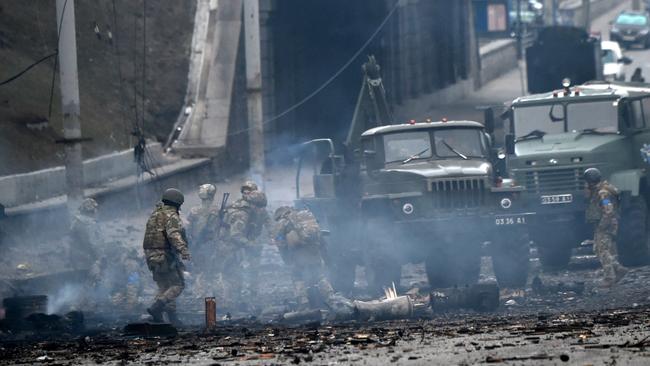
The Russian defence ministry said its forces had destroyed 975 military facilities in Ukraine and shot down eight fighter jets, seven helicopters and 11 drones.
It said Ukrainian servicemen were laying down arms “en masse”.
The heavy fighting was taking a grim toll, with reports of at least 198 civilians killed, including children, as missiles and artillery shells struck apartment buildings and non-military targets.
While fighting raged in Kharkiv, the city administration in Kyiv, 400km to the west, said the capital remained completely under the control of Ukrainian forces despite clashes with “sabotage groups”.
Russian rockets blew up an oil depot 40km south of Kyiv and a gas pipeline at Kharkiv, while another reportedly struck a nuclear waste disposal site outside the capital without breaching its radioactive tanks.
NATO-supplied anti-tank weapons were also reportedly taking a toll on advancing forces, with Ukrainian claims of dozens of Russian armoured vehicles destroyed.
In one video posted online, a Ukrainian soldier carried a shoulder-fired missile launcher near two already burning Russian vehicles, amid the sounds of heavy gunfire.
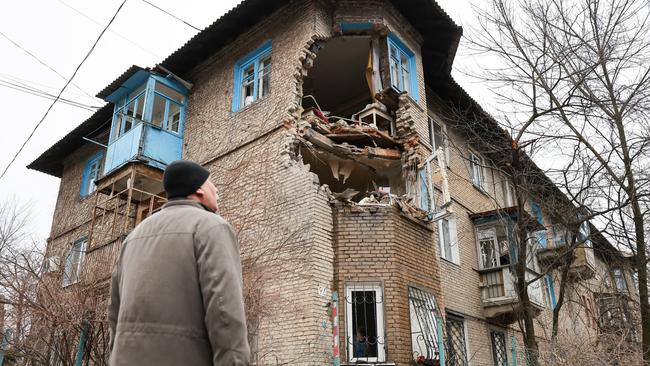
As air raid sirens rang out in the capital at the weekend, residents sought sanctuary in subway stations and cellars. The city said anyone caught outside between 5pm and 8am would be considered “members of the enemy’s sabotage and reconnaissance groups”.
More than 150,000 Ukrainians had fled the country since the war began, the UN said, with cars continuing to clog the roads for tens of kilometres at western border checkpoints.
Able-bodied men and many women continued to take up government-supplied arms, with about 37,000 reservists joining 125,000 active troops to defend their country.
The Ukraine defence ministry said the country’s citizen forces had “become a formidable force destroying the enemy”.
“Tens of thousands of people have already joined the ranks of the Armed Forces of Ukraine Territorial Defence Forces,” it said.
“Now you can join the construction of checkpoints, block the movement of columns of enemy equipment, and perform other tasks assigned by the command … using your weapons.”
Britain’s Ministry of Defence said in an intelligence report that Russian forces were “not making the progress they had planned”.
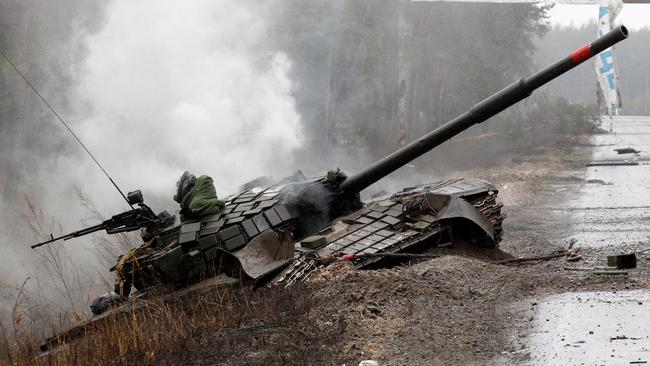
“They are suffering from logistical challenges and strong Ukrainian resistance.
“Russian forces are sustaining casualties and a number of Russian troops have been taken prisoner by Ukrainian forces,” it said.
The continuing resistance surprised many and emboldened the Ukraine Defence Minister, Oleksii Reznikov, to declare on Twitter: “The world doubted. But we did not just stand, we confidently continue to fight with Russian occupant!”
In the southeast of the country, Russian forces have made significant ground, reportedly overrunning Melitopol and destroying the village of Sartana.
Russian forces from Crimea were close to uniting with comrades from Donbas on Sunday and were almost encircling Mariupol, which risked being cut off.
In the Black Sea area, Mykolayiv Oblast mayor Vitaly Kim reported Russian tanks were moving through the city and there was heavy fighting.
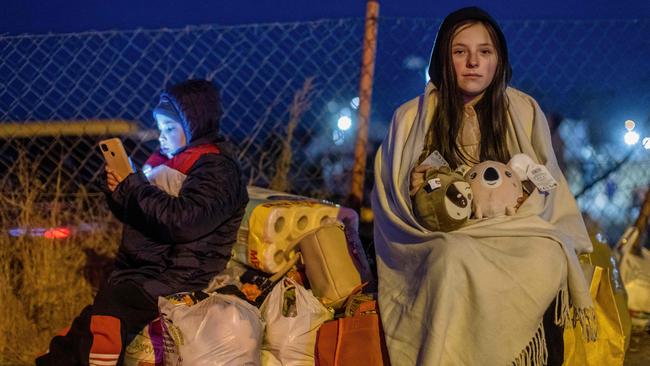
In joint statements, the US, EU, UK and Canada vowed to turn Russia into a financial pariah state, banning it from using the global payment system to transfer funds internationally, and cutting off its central bank’s ability to use $US600bn in foreign exchange reserves.
“We will paralyse the assets of Russia’s central bank,” European Commission president Ursula von der Leyen said.
The US said it was imposing the “Iran model” on Russia, forcing its banks to “use a telephone or a fax machine” to transfer funds, prompting most banks to “stop transacting with them all together”.
With its central bank targeted, Russia would be unable to use its foreign currency reserves to offset the financial pain of sanctions.
“Russia has to be able to sell those reserves and buy roubles to support its currency; we have disarmed the central bank, preventing EU, US and UK persons from selling roubles,” a White House official said.
Germany backed the moves and in a dramatic shift overturned its historic ban on sending weapons to combat zones, announcing the provision of 1000 anti-tank weapons and 500 Stinger anti-aircraft missiles for Ukraine’s military.
“The Russian invasion of Ukraine marks a turning point,” German Chancellor Olaf Scholz said. “It threatens our entire post-war order.”
Additional reporting: AFP

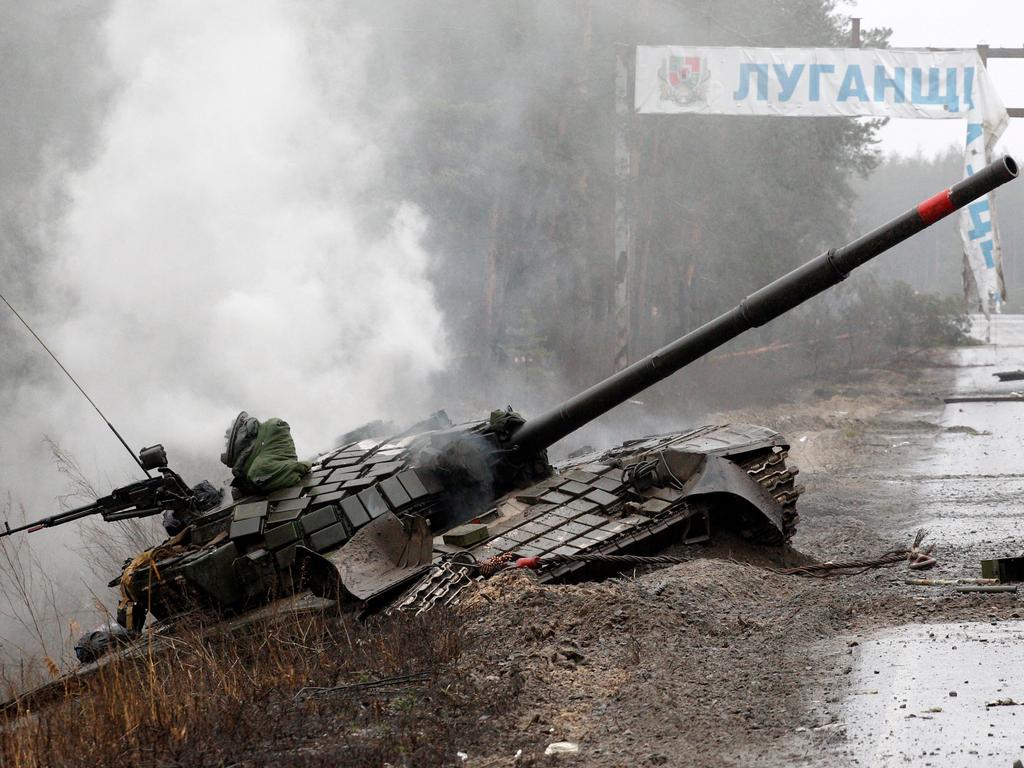





To join the conversation, please log in. Don't have an account? Register
Join the conversation, you are commenting as Logout